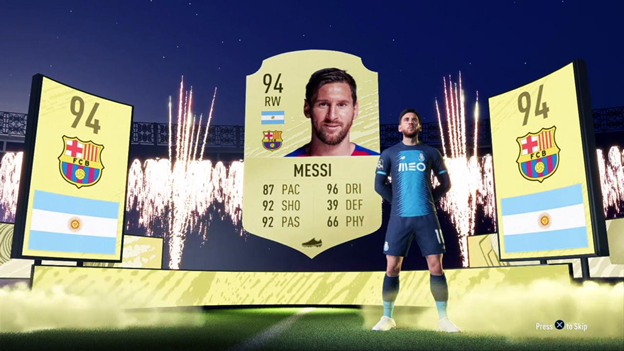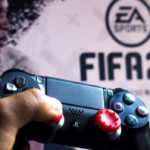FIFA Addiction: How to Overcome Your Gaming Problem

FIFA, the world’s most popular football game, is in contention to be one of the most popular sports games of the year. The latest release by EA, FIFA 22 is already being played in over 200 nations worldwide, with an average of 89 million matches being played per day! With this in mind, we should show some concern for the avid gamers who are at risk of developing video game addiction. However, if you’ve been questioning your gaming habits and relationship with the game then you came to the right place. We are going to break down the best ways to overcome your FIFA addiction.
Content
FIFA Addiction Stories

CEO Spends £13,000 in Game
A middle-aged man reportedly filed complaints against EA Sports after developing an addiction to FIFA Ultimate Team, which led to him spending €15.000 or close to £13,000 on the game. For those who are unfamiliar, Ultimate Team is a mode where players can buy, sell and open packs containing football players in order to build their “Ultimate” football team. Players use virtual currency in the form of gold coins which can be earned in-game. However, the alternative is to buy FIFA Points for real money which is the solution for those who haven’t time to grind out gold.
He explained that his purchases initially started small with €10 at a time to improve his team. But slowly he started to become more invested in his team as they improved and the money went in. Over three years he calculated that he had invested over £13,000, a few thousand shy of a house deposit, on Ultimate Team.
His complaint was that opening packs were entirely dependent on luck and the Ultimate Team system itself is like a casino. Many who have parted with their hard-earned cash to progress in Ultimate Team strongly agree.
He blames the cycle of addiction leading to him losing his social life and his money. But this is what it took for him to realise that the game he loved so much had turned into his “worst nightmare”
Anthony Joshua Was Addicted to FIFA
World Champion Heavyweight boxer Anthony Joshua revealed that his addiction to FIFA almost cost him his boxing career. He explained that he was so hooked on the game that he would stay up until 5 in the morning playing and then have to make it to training at 7. The game completely derailed his rest and recovery schedule which is essential to the life of any athlete.
He further explained that he had spent hundreds of pounds on FIFA Packs claiming that it’s not healthy at all and he knows how it feels. Obviously, he has since made the healthiest decisions for his career and has cut down on the game.
The take-home here is that video game addiction doesn’t discriminate from young kids to big celebrities; anyone can fall victim. Hopefully, we can learn from their mistakes and develop a healthier relationship with the game.
What Makes FIFA So Addictive?

Players from all over buy and play the game every year as loyal fans but often don’t understand why they do it. All video games have features that make them addictive but FIFA’s seem more subtle as the premise of sports games is very simple. Hence they usually add things such as Ultimate Team to keep players on board. Here are some of the most addictive qualities of FIFA.
Pack Openings
Probably the most addictive part about FIFA is opening packs to get players for your Ultimate Team. The better the players available in the packs the more they cost, all in an attempt to get lucky and win big. In many ways, this does show similarities to gambling and has received lots of backlash from the media and various governments. The Belgium minister of justice claimed that mixing this gambling with gaming is “dangerous for the mental health of a child”.
Despite this, many people see it as good fun and it is glamorised amongst the community with Youtube channels dedicated to doing thousands of pounds worth of pack openings. The thrill of opening the player they have been hunting for or getting that Team of the Season Messi is a FIFA player’s dream.
The Ultimate Team app also allows the players to access the trading and pack opening platform from laptops, tablets or any mobile device. Meaning it can be accessed from anywhere. It’s not uncommon for users to completely disregard the main game and not even play football. People purchase the game just for the rush of gambling on Ultimate Team.
Gambling addiction is another one of the elements contributing to the addictive nature of this game. However, the treatment options that we advise are still applicable to treating behavioural addictions such as this.
Competitive Nature of FIFA
When it comes to sports games and fighting games what makes them so infuriating to lose at is that it’s just you and your opponent. No team to fall back on and only yourself to blame for the loss. For those who are extremely competitive, this sensation can be very rage-inducing. Hence players invest more time into the game to improve their skills and beat their opponents.
Winning games of FIFA online are incentivised by winning gold which can be used to buy packs in Ultimate Team. However, many players felt unsatisfied with this as a reward so made things more interesting between each other to fuel their competitive drive. Thus the FIFA Pink Slips matches were born. Coined by players and popularised by famous YouTubers like KSI, players would match up against each other and come to an agreement to wager any one of their players. The player would choose which of his opponent’s players he’d like to take upon winning and vice versa.
This added another layer of gambling into the mix but only for those who were at a decent level at the game and fancied their chances against anyone online.
Social Interaction
Finally, the social aspect of FIFA is what gets players hooked and keeps them playing for hours. Undoubtedly FIFA is a social game. Whether you’re hopping on to play at a party, a local tournament or having fun online with your friends in pro clubs. The game brings people together.
The fun element of comradery and working together with friends on pro clubs, where up to five of you can control individual players on one team, makes for hours of fun. However, this has been known to slowly consume people’s social lives as they rely on their online friends for social interaction. Slowly but surely they are entirely dependent on FIFA for socialisation and are neglecting their real-life friends and family. Which, is a major symptom of video game addiction.
For young children with video game addiction, this can be especially harmful as face to face interactions are essential for building key communication skills that they will need throughout life.
Furthermore, online friends can often contribute to the addiction and temptation when trying to cut down on playing. All it can take sometimes is the urge to play a message from the right friend to have you back to playing till all hours of the morning again.
Symptoms of FIFA Addiction

FIFA addicts seldom realise that they have a problem until it’s too late. So, here are some of the most common symptoms of FIFA addiction that we can look out for:
- Obsessive thinking about playing FIFA
- Lying to others about your gaming habits
- Neglecting responsibilities in order to play FIFA
- Damage to personal and social relationships due to excessive playing
- Inability to resist urges to play the game
- Repetitive strain injuries
- Headaches and eye strain
- Loss of interest in other activities or previous hobbies
- Decline in mental health and general mood
- Fall in performance at work/school
If you begin to notice any of these symptoms over the course of a 12 month period due to your gaming habits then it might be time to seek help.
How to Overcome Your FIFA Addiction

The symptoms and addictive nature of the games that we explain aren’t to scare you. But they should help to make us more vigilant about falling into an addiction. Developing video game addiction is never the end of the world. There are many clinically proven methods to help cut down on video games and build a healthier relationship with gaming that we are going to share with you.
Taking a Detox From FIFA
When we say to detox from FIFA what it means is to cut out FIFA or any other video game content for a 90 day period. That’s not to say “I can’t play FIFA so I’ll just play Call of Duty instead” taking a detox from video games means that there can be no video games until the detox period is over.
The purpose of doing this is to give your brain a chance to recover from the chemical imbalance caused by your addiction. Often our brains become dependent on the dopamine hit we get from gaming and require more of it to feel the same rush that we used to. Similar to how a coffee addiction works.
Secondly, it helps to give perspective and learn that there are greater pleasures in life to be had outside of video games. It’s quite likely that in the midst of your addiction you forgot what life was like without FIFA. So, see this as an opportunity to get back in touch with all the other things you enjoyed in life.
Of course, cutting out the game that you love so much is easier said than done so there are a few things we can do to make this process easier. For one, we recommend finding alternative activities to playing FIFA. When we cut out playing FIFA we will be left with lots of free time and if we spend it doing nothing eventually it will result in boredom and playing FIFA again. So try to find at least 3 different activities that can satisfy what FIFA used to offer. An activity that offers social interaction, one that offers a competitive outlet and another that is low energy and can be done to relax.
We also recommend that you make a schedule for the day to follow. It doesn’t have to be super strict but it should tell us what we have planned to do for the day to eliminate the temptation of playing FIFA. Again free time with no direction is easy to fall back into playing the game so occupy yourself.
Increasing the Barrier for Entry
This refers to making FIFA more difficult to access. As we know FIFA is an easy game to load up and play. No matter what your console, all it takes is 30 seconds and you could be searching for a game. Like we mentioned earlier, to make matters worse Ultimate Team is mobile so it goes wherever we go.
In order to buy us some time to think rationally and add extra steps to loading up the game again here are a few things we can do:
- Unplug our consoles or hide them in an inconvenient place
- Hide our controllers
- If you can’t stand self-imposed limits then lend your console or controllers to a friend for the time being
- Hide the app on your phone or delete it if you feel comfortable
As obvious or silly as some of these might seem, the purpose of them is to break your habit loop. Playing FIFA for long hours has likely developed into a habit. Something we carry out without giving conscious thought to. When it comes to stopping addictive behaviour this is dangerous. so, we need to put measures in place that make us think about what we are doing so that we can make the right decision.
ACT Practises
Cutting out gaming is an essential part of recovery from video game addiction. However, it’s during this point where many gamers start to feel withdrawal symptoms and cravings that lead to them relapsing. ACT stands for Acceptance & Commitment Therapy which is a clinically proven method to reduce the effects of addictive thoughts and reduce symptoms of gaming addiction. ACT is used in in-person therapy sessions to help treat, depression, anxiety, OCD and behavioural addictions. So its applications are far-reaching.
ACT works by teaching us how to allow our thoughts to exist in our minds without fighting them and then allowing them to pass. When we have a craving and we battle against it in our mind it is very emotionally draining and we begin to dread having them. This mental battle against our thoughts adds an additional layer of pain and suffering which can result in running to video games again in order to escape.
Practising ACT exercises enables us to become okay with these negative thoughts and act in a way that is consistent with our values. ACT is practised mainly through meditations and thought exercises. One metaphor we like to give to our users to get them started is the Sailing Boat Metaphor.
Our mind is the boat sailing on the ocean which represents our thoughts. When sailing it’s inevitable that water will flow over into the boat and it is our job to bail the water out in order to stay afloat. When water starts to get rough and flow in more than we can handle our normal response is to bail water out frantically. We get so caught up in getting rid of water as quickly as possible we often forget about the direction our boat is headed and the course we have set.
Alternatively, we can mindfully and calmly bail water out to keep our focus on the course ahead.
The take-home message here is that ACT teaches us to calmly and mindfully bail out our negative thoughts when we experience them as opposed to fighting against them. Sometimes desperately trying to fight against going under is what makes us lose our way. So next time you experience your cravings, bear this in mind.
If you have been having trouble with your gaming habits or want to know how to quit or cut down, The Mindful Gamer is always here to help.








